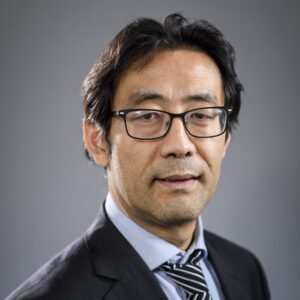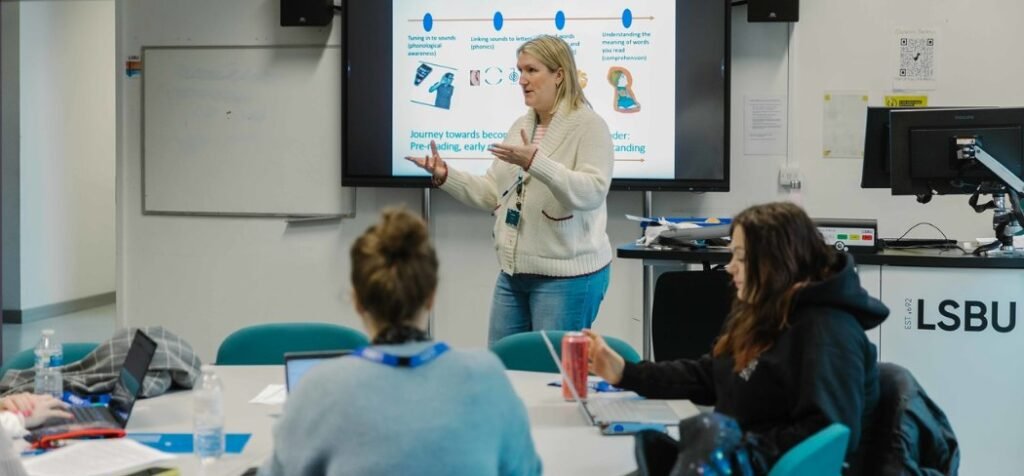Electronic and Electrical Engineering
Course overview
In collaboration with:
- Audience:
- Total duration:
- Learning hours
- Access details:
- Prerequisites:
- Certificate awarded:
- Acreditation:
- Course content:
- Last two years high school
- 2 weeks
- 3 hours
- 100% online, any device
- Parent consent
- Digital certificate of participation
- CPD acreditated
- 2 hrs of non-demand video 10 interactive learning activities
Absolutely helpful, it was more than I expected! Instead of getting just words, I was thrown into the world of science where I am planning to spend my life.
- Vshivkov, Cyprus
This course aims to introduce you to the degree of Electronic and Electrical Engineering. By collaborating with London South Bank University, Professor Perry Xiao, current students, and alumni, we provide a well-rounded view of the degree. You’ll explore fundamental principles and practical applications, gaining insights from various perspectives to reflect the real-world experience and realities of the field. This comprehensive view will help you appreciate the full spectrum of the degree—from academic learning and campus life to career opportunities after graduation.
Understanding core concepts: Together with Professor Perry Xiao, we will explore the core concepts of the degree such as microcontrollers, signal processing, and semiconductor devices. Professor Xiao will also discuss emerging areas like nanotechnology and its potential impact on electronic device manufacturing, as well as the integration of AI and machine learning in electronic engineering. Additionally, he will provide tips and recommendations for those who want to pursue this degree. These sessions are designed to inspire you to start your own research and learn more about these topics.
Seeing theory in action: You will attend a session titled “Biomedical Electronics,” allowing you to experience what it is like to be part of a university lecture in this field. The session demonstrates how electronics can be applied to various fields such as healthcare, technology, and transportation. Professor Perry Xiao will specifically show you an application in the biomedical field.
The session covers:
- Electrocardiogram (ECG) sensors:
- Measuring heart activity
- Structure and function of the heart
- How ECG sensors measure heart activity
- Demonstration: Connecting and programming ECG sensors with Arduino
- Galvanic skin response (GSR) sensors:
- Monitoring stress and emotions
- Understanding skin conductance and its relation to stress and emotions
- Applications in monitoring sleep quality and emotional responses
- Demonstration: Implementing GSR sensors with Arduino
- Infrared thermal sensors:
- Applications in detecting body temperature and environmental heat signatures
- Principles of infrared radiation and thermal imaging
- Applications in detecting body temperature and environmental heat signatures
- Demonstration: Using thermal cameras for biomedical applications
Life and career perspectives: In addition to the technical knowledge, you will gain insights into student life and career opportunities. Hear from current students and alumni about their experiences living and studying at London South Bank University, including the realities of studying abroad. Learn how graduates have transitioned into the workforce and applied their degrees in various fields.
 Meet Professor Perry Xiao
Meet Professor Perry Xiao
As part of your journey into the fundamentals of electronic engineering, you will have the opportunity to learn from one of the leading experts in the field, Professor Perry Xiao.
Biography: Professor Perry Xiao is a Professor and Course Director in the School of Engineering at London South Bank University. With a BEng degree in Opto-Electronics, an MSc degree in Solid State Physics, and a PhD degree in Photophysics, he brings a wealth of knowledge and experience to the course. He is a fellow of The Institution of Engineering and Technology (FIET) and a senior fellow of Higher Education Academy (SFHEA).
Research and innovation: Professor Xiao's primary research interests include developing novel infrared and electronic sensing technologies for skin measurements and industrial Non-Destructive Testing (NDT). His work has led to significant advancements in these areas, demonstrating his dedication to innovation and practical applications of electronic engineering.
Entrepreneurial impact: As a Director and Co-founder of Biox Systems Ltd, a university spin-out company, Professor Xiao has played a pivotal role in creating groundbreaking products. His company designs and manufactures AquaFlux©, a patented novel condenser-chamber TEWL measurement technique, and Epsilon, a capacitive image instrument. These instruments are used by over 200 organisations worldwide, including renowned universities, hospitals, and leading international cosmetic companies such as Unilever, P&G, L'Oreal, Johnson & Johnson, GSK, Boots, Colgate-Palmolive, and Pfizer.
What you will gain: Professor Xiao will share his expertise, providing insights into core concepts and applications of electronic engineering. Through his pre-recorded sessions, you will see both the theory and practice of these concepts. Additionally, he brings experience and wisdom, offering advice, tips, and detailed guidance for future career development.
 In collaboration with London South Bank University, Academic Action presents a unique educational opportunity in the fundamentals of electronic engineering. Recognising the value of the institution where you study is essential, and LSBU stands out for numerous reasons.
In collaboration with London South Bank University, Academic Action presents a unique educational opportunity in the fundamentals of electronic engineering. Recognising the value of the institution where you study is essential, and LSBU stands out for numerous reasons.
Location and Facilities: Situated in the dynamic Southwark area of London, LSBU offers a campus experience that combines the benefits of a central location with a close-knit academic community. The proximity to key landmarks and strong transport links ensures that students have access to the cultural and professional opportunities that London offers.
Commitment to Excellence: LSBU is renowned for its focus on employability and practical education. The university's dedication to providing industry-aligned courses has earned it recognition for high graduate employment rates, including the accolade of University of the Year for Graduate Employment by The Times and The Sunday Times Good University Guide. This commitment is reflected in the university’s accredited courses, which are developed in collaboration with leading professional bodies.

Innovative Mindset: Fostering an enterprising spirit, LSBU encourages students to embrace opportunities and develop entrepreneurial skills. This approach has garnered awards such as Entrepreneurial University of the Year by Times Higher Education, highlighting the university’s role in nurturing innovative and resourceful graduates ready to make a significant impact in their chosen fields.
Diverse and Supportive Community: LSBU prides itself on its inclusive environment, supporting students from a variety of backgrounds, including those who are the first in their families to attend university. Comprehensive support services and a strong emphasis on student well-being ensure that all students have the resources they need to succeed academically and personally.
By choosing LSBU, you join a vibrant and inclusive community in the heart of London, with access to exceptional educational resources and a commitment to your future success.
For more information about LSBU, you can visit their official website.

Understanding what to study is not only about earning a degree but also about foreseeing a potential career. Here are some examples of career pathways you can pursue with a degree in electronic and electrical engineering, categorised by experience levels:
Graduate Level:
- Electronic Engineer: Design, develop, and test electronic systems and components. Projects could include developing consumer electronics like smartphones or medical devices such as portable ECG machines.
- Tech Start-Up Founder: Use your engineering skills to create innovative products or services. This could involve starting a company focused on IoT devices or developing new wearable health technologies.

5 Years of Experience:
- Senior Electronic Engineer: Lead design and development projects and mentor junior engineers. Example activities include overseeing the development of advanced robotics systems or leading teams in the creation of autonomous vehicles.
- Small Business Owner: With experience, you could start your own consultancy firm, providing expert advice on electronic systems and technologies to businesses and organisations.
10 Years of Experience:
- Engineering Director: Manage engineering departments, develop strategic plans, and oversee large-scale projects. Activities could include leading the innovation strategy for a technology firm.
- Tech Entrepreneur: Leverage extensive industry experience to launch a successful technology company, focusing on cutting-edge innovations like AI integration or sustainable energy solutions.
 These roles are just a few examples of the career paths you can pursue with a degree in electronic and electrical engineering. Each position offers opportunities for growth and specialisation, allowing you to tailor your career to your interests and strengths.
These roles are just a few examples of the career paths you can pursue with a degree in electronic and electrical engineering. Each position offers opportunities for growth and specialisation, allowing you to tailor your career to your interests and strengths.
By understanding these pathways, you can better plan your educational and professional development to achieve your career goals.
Electrical and electronic engineering is a large field with a variety of degrees and combinations available. Here are some of the degree options you can pursue:
Undergraduate Degrees:
- BEng in Electrical Engineering
- BEng in Electronic Engineering
- BEng in Electrical and Electronic Engineering
- BEng in Mechatronics
- BEng in Robotics Engineering
- BEng in Computer Engineering
- BSc in Applied Electronics
Postgraduate Degrees: For those interested in further specialisation, pursuing a Master’s degree can provide advanced knowledge and open up additional career opportunities. Here are a few options:
- MSc in Electrical Engineering
- MSc in Electronic Engineering
- MSc in Control Systems
- MSc in Telecommunications Engineering
- MSc in Embedded Systems
- MSc in Power Engineering
- MSc in Renewable Energy Systems
These degrees offer advanced studies in various aspects of electrical and electronic engineering, equipping you with specialised skills for your career.

Explore the Courses

UK Study Mentorship Program
Lorem ipsum dolor sit amet, consectetur adipiscing elit. Ut elit tellus, luctus nec ullamcorper mattis, pulvinar dapibus leo.
- List Item #1
- List Item #1
- List Item #1
- List Item #1
Add Your Heading Text
Lorem ipsum dolor sit amet, consectetur adipiscing elit. Ut elit tellus, luctus nec ullamcorper mattis, pulvinar dapibus leo.


UK Study Mentorship Program
Lorem ipsum dolor sit amet, consectetur adipiscing elit. Ut elit tellus, luctus nec ullamcorper mattis, pulvinar dapibus leo.
Lorem ipsum dolor sit amet, consectetur adipiscing elit. Ut elit tellus, luctus nec ullamcorper mattis, pulvinar dapibus leo.

